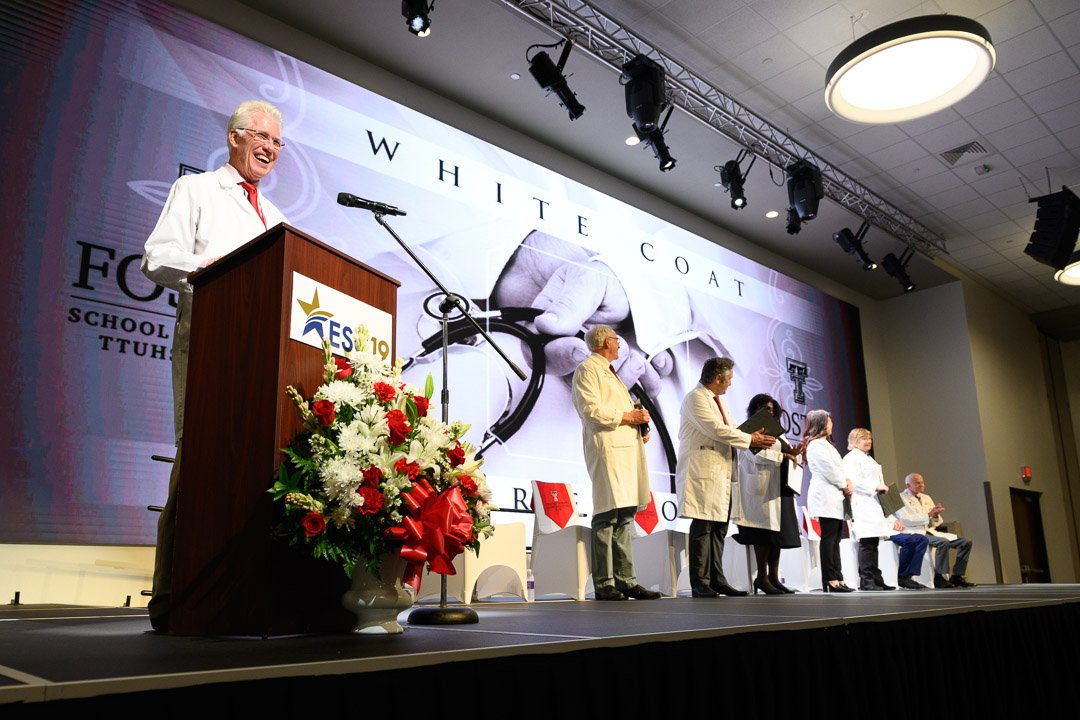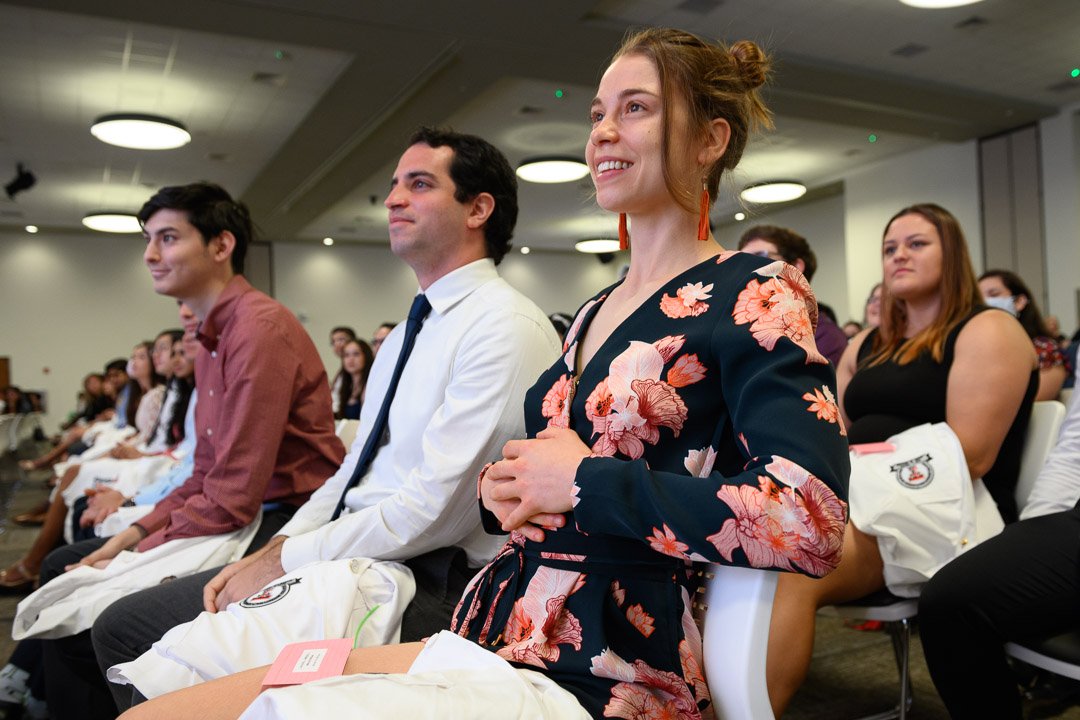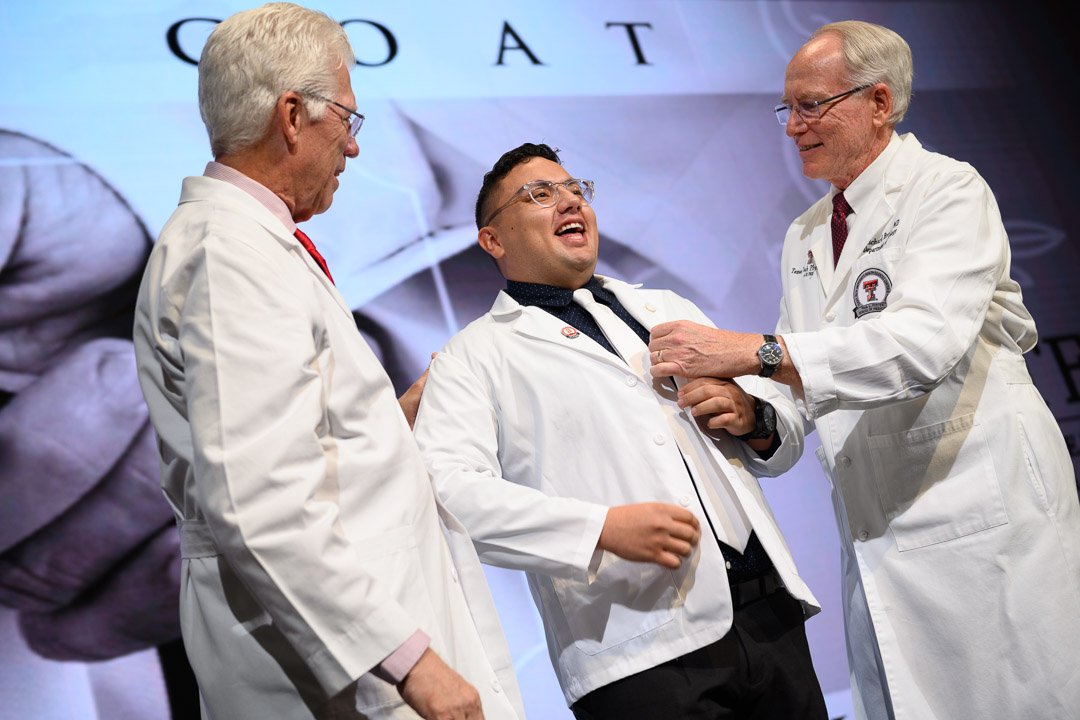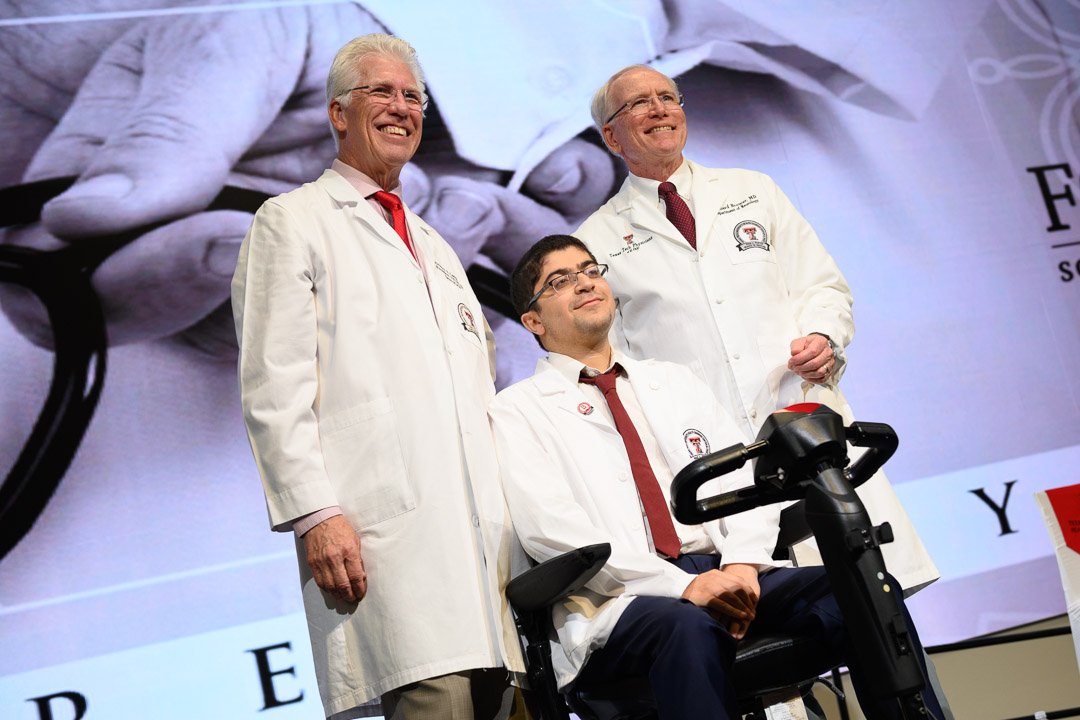Foster School of Medicine White Coat Ceremony 2022
Incoming Foster School of Medicine Students Reflect on Motivation after Receiving Traditional White Coats
Ceremony marks the beginning of medical school for 124 students
The journey to becoming a physician may feel like it’s just beginning for the 124 students who received their first white coats Saturday during a ceremony for the Foster School of Medicine’s class of 2026. However, they have all gone through an extensive journey just to have this opportunity.
The white coat ceremony marks the beginning of a medical student’s first year. Along with receiving the coat, students take an oath in front of faculty, family and peers to acknowledge and reaffirm their choice to serve patients and deliver world-class compassionate health care.
For the fifth straight year, Dionicio Alvarez, M.D., and his wife Alice Alvarez sponsored half of the medical student white coats, even as the size of the class has increased substantially. At 124 students, the class of 2026 is one of the largest in Foster School of Medicine history. TTUHSC El Paso aims to increase class sizes to 150 in the near future. In 2020, the couple also established the Dionicio and Alice Alvarez Medical Scholarship Endowment.
This year’s ceremony was hosted at the Starlight Event Center and featured 124 students, including 19 from El Paso and Las Cruces. Thanks to the Foster School of Medicine, talented students from our Borderplex with a passion for medicine and serving the community have the option to apply for medical school in their hometown.
That includes Maxine L. Silva Health Magnet High School alumnus Nickolas Sanchez, who remembers Texas Tech University Health Sciences Center El Paso faculty members and students visiting his classes.
“When I was at Silva, I saw a surgery at University Medical Center of El Paso. It was amazing how they did it and saved a woman’s life,” said Sanchez, who graduated from high school in 2018. He said witnessing “the mix of technical precision and the life-saving result” spurred his desire to enter the health care field.
Following the Aug. 3, 2019, mass shooting at an El Paso Walmart, Sanchez was certain he wanted to go to medical school and become a physician to help his community.
“That day made me realize how frail life could be, and I realized the importance of relationships with other people, whether they be family or complete strangers,” Sanchez said. “I began to recognize what the beauty of being a physician is: It’s the relationships you develop with your patients.”
To help prepare Sanchez and other future health care heroes, Foster School of Medicine training includes simulation labs where students practice clinical skills on high-tech manikins and engage with role-playing “patients.” Students build confidence in physician-patient relationships and prepare for a wide range of scenarios, including mass-casualty incidents.
Sanchez, who graduated from the University of Texas at El Paso last year, said the white coat is a symbol of what the future holds for him and his future patients. He said when he finishes medical school, he will be the first physician in his family.
Since opening in 2009, there have been nearly 800 graduates of the Foster School of Medicine who have become or are on their way to becoming practicing physicians. The school’s faculty trains students in culturally competent care with the goal of keeping future physicians, such as Sanchez, in West Texas to treat patients in both metropolitan and rural areas to combat local, regional and state-wide physician shortages.
The U.S. Census Bureau predicts a continued climb in the number of Hispanic people in the nation, accounting for 25% of the population in 10 years. However, less than 6% of physicians in the U.S. identify as Hispanic. As the only health sciences center along the U.S.-Mexico border designated as a Title V Hispanic-Serving Institution, TTUHSC El Paso is preparing the next generation of health care leaders, 48% of whom identify as Hispanic and are often first-generation college students.
In 2008, prior to the opening of the Foster School of Medicine, El Paso County’s average number of direct care physicians per 100,000 people was 75% less than the national average and 37% less than the state average. Today, that shortage has been reduced to 60% when compared nation-wide and 28% Texas-wide.
Mariah Black, a graduate of both the University of Kansas and Tulane University, said the white coat represents the responsibility being placed on her to help the community through education, advocacy and medicine. She understands she won’t have to do it alone, but instead as a part of a prestigious and expansive health care team. As a former music major, she is ready to join the ensemble.
“Collaboration is driven into you in music school, and I love to play in a group. You’re not just playing for yourself, but for the whole group,” Black said. “Similarly, you’re not the only physician; you are part of a health care team with nurses, home caregivers, pharmacists, rehabilitation workers and various specialists.”
Music school also helped Black learn to perform under pressure. It’s a challenge she will experience during exams and, later, practicing medicine.
“Music requires you to filter all the external noise and overcome the internal noise, such as self-doubt,” Black said. “It’s about recognizing that you’re the one who’s on stage, or in my case now, enrolled medical school. I’m here for a reason, and I deserve to be here.”
Black is also determined to learn Spanish. As a child, she was not taught by her Argentinian mother. She’s picked up the language as a novice, but now will have the opportunity to practice it and, hopefully, become fluent, she said.
The Foster School of Medicine features a medical Spanish requirement which helps students provide culturally competent care during medical school and throughout their careers. It was one of the first medical schools in the U.S. to integrate medical Spanish into its curriculum.
Students at the Foster School of Medicine receive clinical experience within the first year of the curriculum. This is an unconventional approach among most U.S. medical schools, where students typically begin clinical rotations during the third and fourth years of their medical education.
About TTUHSC El Paso
TTUHSC El Paso is the only health sciences center on the U.S.-Mexico border and serves 108 counties in West Texas that have been historically underserved. From 2012-2021, TTUHSC El Paso has educated nearly 2,100 health care leaders.















